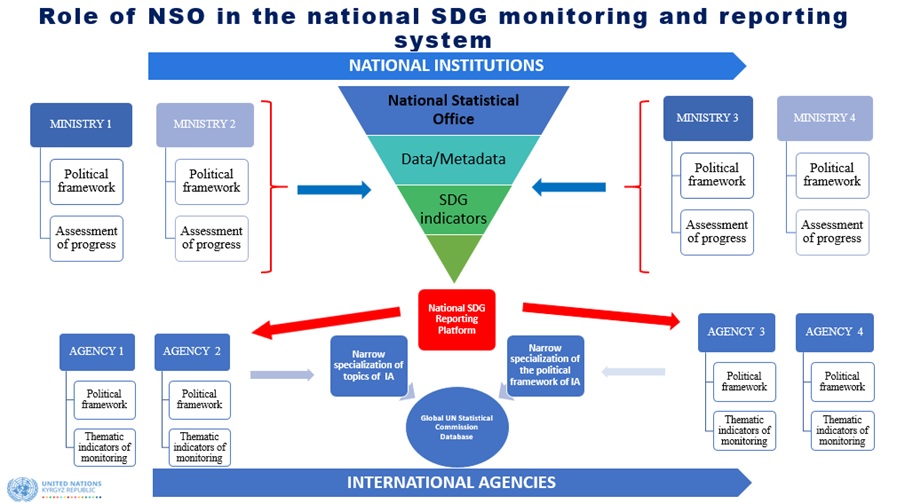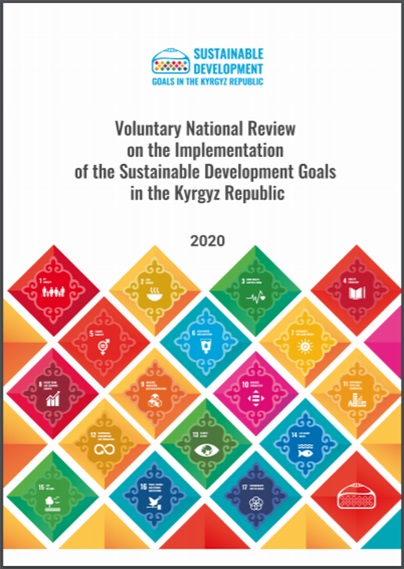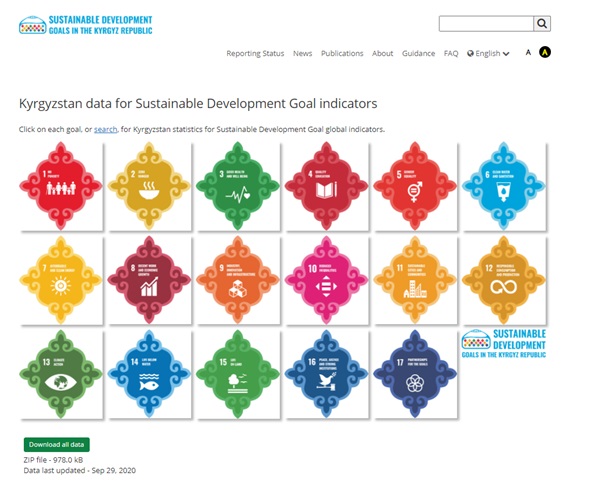Kyrgyzstan
I. General on SDG monitoring set up
National SDG organizational set up
In order to direct and monitor the implementation of the SDGs in the Kyrgyz Republic, the Coordination Committee for the Achievement of the MDGs has been transformed into the Coordination Committee for Adaptation, Implementation and Monitoring of SDGs in the Kyrgyz Republic until 2030. The committee includes representatives of the Parliament (Jogorku Kenesh), the Government, ministries and departments, academia, UN agencies and non-governmental organizations. The committee works directly under the Prime Minister. The secretariat of the Coordination Committee for the Sustainable Development of the Kyrgyz Republic is the Government Office of the Kyrgyz Republic.
The Ministry of Economy is responsible for policy coordination and the National Statistics Committee (NSC) is responsible for organizing SDG indicator compilation and setting up the National Reporting Platform (NRP), which will serve as the main instrument for disseminating SDG indicators.
The National Sustainable Development Strategy of the Kyrgyz Republic for the period 2018-2040 (Strategy 2040) incorporates the 2030 global Agenda for Sustainable Development. The National Council for Sustainable Development of the Kyrgyz Republic adopted Strategy 2040 after a broad public discussion, taking into account the “Trust. Unity. Creation” program of the Government of the Kyrgyz Republic, programs of political parties, proposals of deputies of the Jogorku Kenesh, state bodies, local governments, donor and expert community, public associations, businesses and citizens.

National set of SDG indicators
In 2018, UNSD worked with NSC to assess the capacity of the Kyrgyz National Statistical System to monitor the globally agreed SDG indicators. The assessment identified 39 indicators as available at the time of the study and an additional 56 as easily feasible to produce. Altogether, in 2018, the Kyrgyz Republic was evaluated as ready to provide 95 global SDG indicators, or 46% of all applicable indicators. The goal of the assessment was to inform the development of the indicator framework for monitoring progress toward the SDGs in Kyrgyzstan.
NSC conducted a series of consultations with the line ministries and other government agencies thereafter in order to localize the SDG global indicators in the Kyrgyz Republic and to compile indicators from already available databases across the NSS. As a result, the number of currently available global indicators more than doubled during the period from July 2018 – October 2019 - from 39 to 84. The recommendations provided in this regard by the 2018 UNSD assessment mission were taken on board and the assistance (including validation of the compiled indicators) during a UNSD mission in 2019 also contributed to this encouraging outcome. As of December 2019, Kyrgyzstan has identified a framework of 102 global SDG indicators and 57 national indicators for use in preparing the Voluntary National Review.
SDG reports and Voluntary National Reviews
Kyrgyzstan submitted its first Voluntary National Review and presented it at the High Level Political Forum in New York in July 2020.
As part of the VNR process, the Government established five working groups in 2019, consisting of experts from relevant state ministries and agencies, civil society organizations (CSOs), the private sector and the United Nations system. The working groups are clustered around the three pillars of sustainable development: 1) economic, 2) social, and 3) environmental, but also covered two cross-cutting issues: 4) monitoring and evaluation; and 5) governance and security. To coordinate the workflow of the VNR process the Coordination Commission under the Vice-President of the Kyrgyz Republic was set up.
The National Statistical Committee of the Kyrgyz Republic led the monitoring and evaluation working group, and was responsible for data mapping, inventory, adaptation and collection processes.
Kyrgyzstan has chosen to use the Open SDG platform developed by the UK/US. The platform is populated with both data and metadata and is multilingual. Kyrgyzstan is actively working with ONS (UK) to customize the platform to include better support for SDG metadata, translations and national indicators. UNSD is supporting the development of a customized DSD for Kyrgyz national indicators.
Currently, the Kyrgyz Open SDG platform helps to disseminate 102 global and 57 national SDG indicators in the SDMX format, as well as metadata for these indicators. Moreover, it includes new sections such as “Publications” and “News”.
Overall coordination of National Statistical System
The operation of the national statistics system of Kyrgyz Republic is based on the Law on Statistics adopted by the Parliament of the Kyrgyz Republic on 2 February 2007 amended in 2009 and 2013. The stated purpose of the Law is to provide the legal basis for a uniform policy in the area of state statistics. The National Statistics Committee of the Kyrgyz Republic (NSC) is given the central role in the system and is empowered to obtain statistical data and bookkeeping reports free of charge from all respondents including central and local bodies of executive power, local self-government bodies, banks and natural persons subject to the statistical observations. The Law specifies the principles of data confidentiality and dissemination. It provides also for sanctions in the case of violation of response obligations or obligations regarding preserving data confidentiality.
To ensure the effectiveness of the national statistical system and the production of high-quality official statistics, and to strengthen public confidence in official statistics in the Kyrgyz Republic, a new version of the Law on Official Statistics has been adopted. The objective of this Law is to improve the legislation of the Kyrgyz Republic in the field of statistics by bringing it into full compliance with the Fundamental Principles of Official Statistics.
SDG data coordination committees
The National Statistical System of the Kyrgyz Republic is a centralized system where the National Statistical Committee of the Kyrgyz Republic acts as the main body responsible for coordinating efforts to collect data, produce statistics in accordance with the Fundamental Principles of Official Statistics, and create an evidence base related to the SDGs.
The National Statistics Committee is responsible for organizing SDG indicator compilation and setting up the National Reporting Platform (NRP), which will serve as the main instrument for disseminating SDG indicators.
Responsibility for SDG indicator compilation
In September 2019, an interdepartmental working group was established under the auspices of the Monitoring and Evaluation Working Group to prepare statistical indicators for the Voluntary National Review. Meetings were held with the working groups in preparation for the VNR.
In order to formalize data sharing for SDG indicators, a new section on “Monitoring Sustainable Development Goals”, which consists of 74 statistical works, was included in the official annual Statistical Works Programme, detailing the responsible ministry or department and the frequency of data submission to the NSC for each work. The Statistical Works Programme is approved annually Government Decree, which increases the responsibility for SDG indicator compilation among data providers.
The Statistical Works Programme, approved annually by Government Decree, is the main document which facilitates official data and metadata sharing between NSC and data producers. The Statistical Works Program includes 75 activities related to SDG indicators.
Actual data sharing mechanisms
Most of data exchange takes place on written request. Response is normally on paper, with a signature and seal, giving it an official status. Excel spreadsheets sometimes accompany the response to provide the data in an electronic format in addition to paper.
Open data and other good practices
Taza Koom (“Clean Society”) is a multi-year strategy that aims to bring about digital transformation and transparency to the government, involving almost all government agencies. An important component of Taza Koom is Tunduk, an interoperability platform established with support from Estonia based on the Estonian e-Governance system, and the related State E-services Portal.
The main objective of Tunduk is to serve as a hub with “pipelines” for data related to government functions and activities, reducing reporting burden, duplication of effort and discrepancies. A law adopted in April 2018 has mandated that all data exchanged by/with government agencies must be routed through Tunduk, including NSC. Tunduk will also be linked to the new government Open Data portal.
IV. Data availability and disaggregation
Work to make more indicators available
A one-month consultancy was also carried out at the end of 2019 to assist NSC in compiling more national data and metadata. These efforts resulted in a list of around 150 indicators with available data, which will be included in the country’s Voluntary National Review in 2020. Through technical support from UNSD, Kyrgyzstan was also able to create a Data Structure Definition for its national indicators for SDG monitoring and reporting, paving the way for electronic data exchange via SDMX.
Within the project support, NSC developed a “Road Map on monitoring SDG indicators of the Kyrgyz Republic”. Over the next 5 years, NSC is planning to concentrate on the implementation of this Roadmap, which includes more than 60 methodological works on the production of new SDG indicators and disaggregated data for available ones.
Work to allow more disaggregation
The Kyrgyz Republic follows the «leave no one behind» core principle of the 2030 Agenda, and therefore much attention has been paid to the disaggregation of SDG indicator data. An analysis of the accessibility of global indicators revealed that, as of 1 January 2020, disaggregation of data for 55 indicators was possible by geographical location, 42 by sex, 29 by age, 19 by income and 18 by education. However, gaps remain in the ability to disaggregate data on disability (8 indicators) and migration status. From 57 national indicators, 25 are disaggregated by territory, 14 by gender, 7 by age, 5 by education and 2 by level of income and disability. >
To obtain disaggregated data on disability, NSC added new questions on health to Census questionnaires. The questions were developed by the Washington Group on Disability Statistics.
In December 2019, NSC, together with the international consultant from UNSD working on indicators, carried out a capacity building workshop on “Data and metadata for the SDGs” targeting representatives of ministries and departments, non-governmental organizations and the scientific community on compiling metadata for SDG indicators. As a result of the workshop, NSC sent a metadata template to relevant ministries and departments to complete. To date, NSC was able to compile metadata for 102 global indicators and for 57 national ones.
Kyrgyzstan already has a communications strategy with strong user engagement components. A UNSD mission in December 2019 conducted a workshop to develop an SDG-specific user engagement module to build onto the strategy.
Kyrgyzstan has also already started implementation of agreed upon user engagement activities included in the national implementation plan for the UNSD-DFID project. This includes: development of promotional materials on SDGs (brochures, commercials, calendars and other special publications), holding an open House for the general public to engage with users and assess their needs, organizing press conferences on the topic of “SDGs and statistics” with representatives of the media / journalists to raise awareness of the SDGs, and meeting with parliamentarians to raise awareness of SDG monitoring and the use of SDG indicators in the decision-making process. Some of these activities had to be reimagined and redesigned as a result of COVID-19.
NSC, with the support of the project, is working on developing COVID-19 statistics. A draft national set of indicators to monitor COVID-19 and its influence have been developed. The set of COVID-19 indicators show economic and social changes in the Kyrgyz Republic due to COVID-19. Moreover, NSC is conducting a telephone survey and an online survey on the “Influence of COVID-19 on households of the Kyrgyz Republic”.




